Honey And Clover
Reposted from an older blog. Originally posted on 08/31/06.
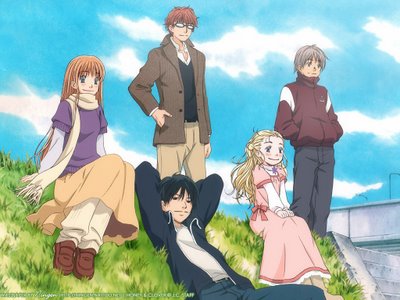
I don't know where to begin talking about Honey and Clover. I know that it has already earned a place as one of my favorite anime series, and that it has moved me in a way that only the best series I've ever seen have. I know that I love the characters, the people, that populate the world of the story. I know that I am always disappointed when an episode ends. I know that it is one of those rare works of art that, if it hits you right, will change you permanently and stay with you for the rest of your life.
I don't know what else to say. It's too good for my stupid words. But stupid words will have to do, I suppose, and I have to say something more than, "You must watch this series at all costs."
So let's start with the basics. Honey and Clover is a drama series that deals with the lives, loves and dreams of a group of students at a Tokyo art college, along with their friends, family members and co-workers.
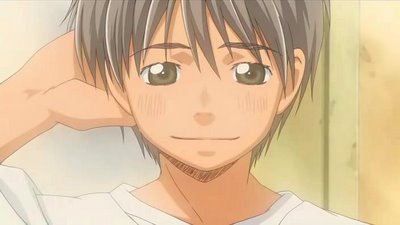
The de facto main character of the series is Yuuta Takemoto, who is beginning his second year when the story begins. Takemoto (we'll use last names for a few of the characters, as that's how they're addressed in the series) is a fairly normal college youth; he's poor, he lives in a low-rent apartment building, he likes to hang out with his friends, etc. He's in art school because he likes to create things, but doesn't really know what he wants to do with his life beyond that.
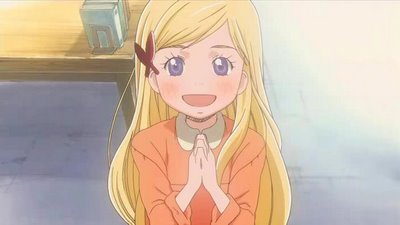
Takemoto's life is thrown for a loop when he meets Hagumi Hanamoto. Hagu is a small, childlike, and extremely skilled artist who - despite having the appearance and personality of a child - is actually college aged and about to begin attending Takemoto's school. Hagu is adorable. She's eccentric. She's lovable. Everyone who comes into contact with her is astounded by her art, and is amazed to see the world through her eyes.
Unfortunately, being such a great artist has its drawbacks. Not particularly resilient to begin with, Hagu is under constant stress that wreaks havoc with her physical and mental health. She is always pressured to create new works for art galleries and other benefactors, and is subject to the unwanted attention of her professors, who want to make sure she doesn't "waste" her talent by turning down opportunities for work. She also faces scorn from her classmates, who don't appreciate the attention she gets from everyone around her and don't understand what she's going through. Furthermore, she is perpetually in battle with herself, trying to find the will and strength to create freely and at her own pace even with the stresses that surround her.
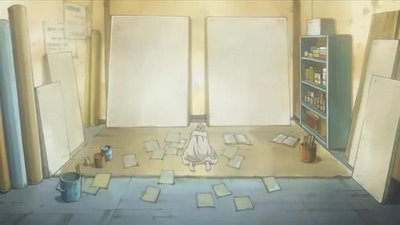
Takemoto falls in love with Hagu the very first time he sees her, but the enormity of her talent puts a gap between them that he simply cannot bridge. The two become good friends, with her feeling very comfortable and comforted around him, but he knows that he can do nothing to help her in her struggles. This impotence, combined with his sense of awe toward the quality of her work, leads him to question himself and what he's doing with his life, and his search for a purpose and direction becomes a major thread of the series.
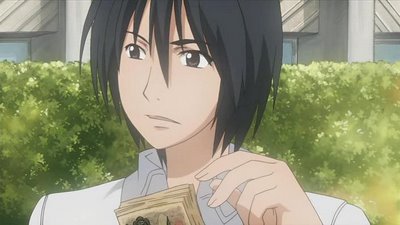
The relationship between Takemoto and Hagu is further complicated by Shinobu Morita, who might be the only person in Hagu's life who can fully understand her and interact with her on the level that she needs. Morita is like Hagu in many ways - he's an unusually gifted artist, he understands the value of acting like a kid sometimes, and his eccentric nature separates him from other people - but unlike Hagu, he is free-spirited and somewhat immune to life's troubles. He's something of an enigma. He can be completely selfish and silly one moment, and surprisingly insightful and sensitive in another. He often disappears for days, weeks, or even months at a time, and returns without notice, zombified from sleep deprivation and carrying a wad of cash of unknown origin. He's just an unpredictable person in general, but the love he shows for his friends earns their affection and understanding.
Like Takemoto, Morita falls for Hagu almost immediately, initially using her as an unwilling subject for his unusual works of art but eventually realizing that his interest in her extends beyond that. Like Takemoto, Morita is moved by Hagu's creative works, but unlike Takemoto, he has the ability to return that favor to Hagu. His work inspires her the way hers inspires other people, and the two come to a silent understanding that they each want to live up to the other.
I could go on about the Takemoto/Hagu/Morita situation all day, but there are other stories going on in Honey and Clover and other characters who deserve our attention.
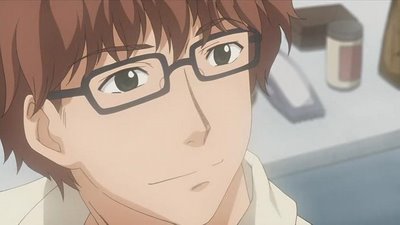
Takumi Mayama is a friend of Takemoto, Hagu and Morita, and is just about to graduate from the school at the beginning of the series. There are two major sides to Mayama's personality: one is a very sweet and generous person, and the other is...well, a stalker. Mayama is in love with a woman named Rika Harada, who has hired him to help with her small (two people, including Mayama) design company. Rika is a broken, damaged woman, both inside and out, and this vulnerability leads to Mayama developing a sense of protectiveness over her. Unfortunately, this protectiveness can go too far, pushing Mayama to do things that are just a little off kilter from healthy behavior.
Regardless of his sometimes creepy actions, Mayama obviously has a big heart and a (relatively) good head on his shoulders. The question is whether he will end up helping or hurting Rika in the end.
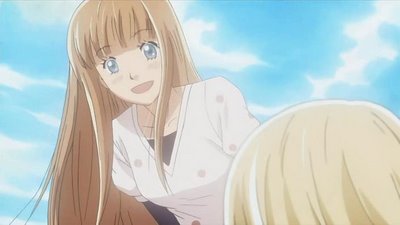
A pottery student at the school, Ayumi Yamada is also part of the group of friends at the core of the show. Ayu's life is one that is filled with heartbreak and longing. She is utterly, painfully in love with Mayama, and even though she knows she will never have him, she simply cannot let go of her feelings for him. It's hard to see her go through these emotions, especially because she is such a good and kind person. She's very strong in many ways, but everything involving Mayama just destroys her. What's worse is how much her feelings for Mayama hold her back. Aside from a handful of exceptions, pretty much every guy Ayu comes into contact with on a regular basis is completely taken with her. She has at least two entourages of good young men who worship the ground that she walks on. Unfortunately, she simply can't feel the way about any of them the way that she feels about Mayama.
The series is a difficult ride for Ayu, as she is perpetually in some stage of heartsickness. Her story is about whether or not she can accept the things she can't have and let go of the feelings that have defined her for so long.
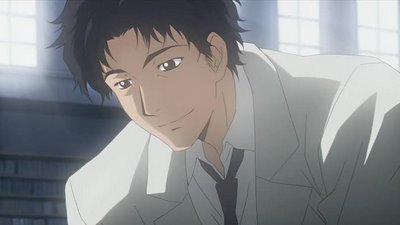
Shuuji Hanamoto is a professor at the college and is sort of the father figure of the group. Most of their gatherings take place in his office or home. Shuuji is Hagu's father's cousin, and it was at his suggestion that she moved to Tokyo to live with him and go to school. Shuuji has a very strong relationship with Hagu. One gets the impression that she is not particularly close to her family, and that Shuuji has stepped in to fill in the emotional gaps left by that estrangement. Shuuji loves Hagu as if she were his own daughter, and would do anything at all to ensure her happiness. Hagu feels just as strongly about him, making the two pretty much inseparable. Shuuji is the one who is there for Hagu during the truly difficult times, even though he admits he can't interact with her on the level that Morita can.
Shuuji is sort of a hub character for the show. He provides everyone with a place to meet, and has a hand in supporting all of the major cast members to some extent. He doesn't have to deal with the same kind of emotional turmoil that the others are going through (at least not in the present), so he focuses mainly on taking care of Hagu and doing his job as a teacher, both inside the classroom and out.
While those six make up the primary cast of the show, there are several other wonderful characters that play important roles as well. Taking the time to describe them all would make this post far too long, however, and meeting new characters and seeing how they affect the others is part of the fun of the series.
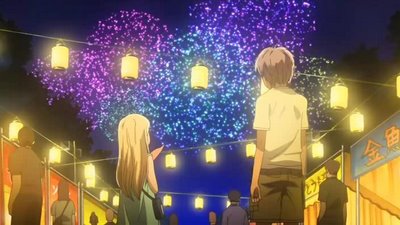
The show is exceptional from a technical standpoint. The folks at J.C. Staff (and all the other numerous studios that lent a hand to the production) really went for broke making the series look, flow, and feel as beautiful as possible at all times. The show may have been made on a television budget, but the consistently solid artwork and animation and the detailed backgrounds do little to give that away. Also notable is the fact that the character designs stick reasonably close to those of the original manga. Oftentimes character artwork ends up being altered significantly in the transition from manga to anime, usually to make the characters easier to draw/animate, but Honey and Clover strives to be faithful to the manga designs, and does a fine job in that department.
The only real complaint I have about the art is that the characters tend to stray from their standard models on occasion. Not in the usual exaggerated anime facial expressions kind of way, which is completely intentional, but on a more subtle level, where you'll notice that a character's hair or eyes or facial structure are different from one shot to the next. This is a fairly common occurance in television anime, but it is a fault that I have to bring up. It generally doesn't detract from the show, however, and I'm fairly certain that many of the most noticable design fluctuations are the restult of moments where the creators have gone out of their way to accurately reproduce a panel from the manga, even when doing so means making a character look a bit different from usual.
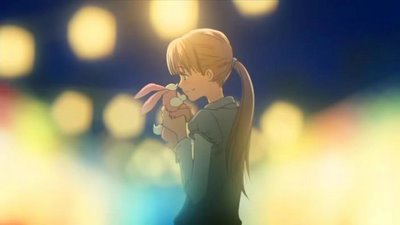
Voice performances are beyond the beyond; suitably effective for a series filled with this much emotion and drama. Yuji Ueda is brilliant as the manic and aloof Morita. Haruka Kudou is adorable as Hagu, and gives her voice an underlying maturity that reminds the viewer that Hagu is much older than she looks and acts most of the time. Hiroshi Kamiya nails Takemoto's sincerety, confusion and frustration, grounding the series with his narration. Mikako Takahashi masterfully handles the difficult job of playing the perpetually heartbroken Ayumi, making her sympathetic without being pathetic and strong but believably vulnerable. Really, everyone involved nails his/her character. Even second-tier characters have memorable performances backing them.
Finally, we come to the music. The title Honey and Clover reportedly comes from the names of author Chika Umino's two favorite albums, by artists Spitz and Suga Shikao, respectively. Appropriately, music from both acts is used frequently in the series, along with songs from other popular Japanese artists like Suneohair. Topping it all off are two opening themes from the iminitable Yuki, and a nice backing soundtrack that makes effective use of melodies lifted from the opening and ending themes.
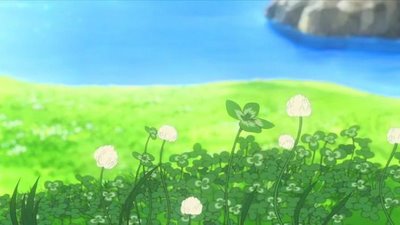
So those are the details you need to know about Honey and Clover. Unfortunately, none of that really conveys the true magic of the series, which is something you can only experience by actually watching it. And watch it you should. Honey and Clover is a must, not only for fans of drama and romance, but for all fans of quality anime.
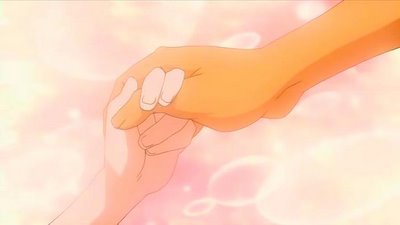
Score: 9/10 (Essential)

0 Comments:
Post a Comment
<< Home